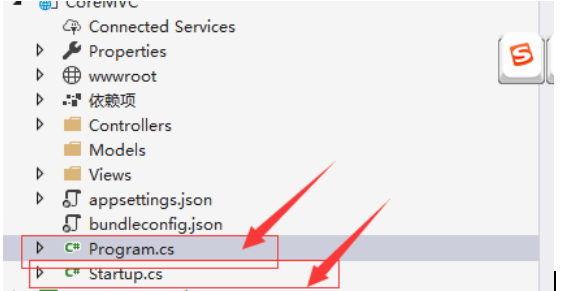AspNet Core Web 应用程序的启动 当项目中 没有Startup.cs 类如何设置启动 配置等等
感叹: Core 16年6月1号 在中国宣布上线 到现在已经快经历两年时间了,目前版本已经到了2.0 就目前的前景来看,个人感觉 到2020年才可能有所起色,等到Core更成熟
个人看法:在.net这条路上总感觉后劲不足,市场好像越来越小了。不过学习还是要学的,毕竟很喜欢 c#
(1)有关怎么创建Core MVC/API 这里就不说了,前段时间的博客中有说过:这里介绍的是有关 AspNetCore web 通用的基础知识,不针对单独的MVC/API介绍,也是我个人学习的结果,写出来希望和大家相互学习讨论,共同进步,希望在大家这里学到更多
(2) 项目创建生成后我们会看到这样两个类 (Program/Startup)如图下图所示

和我们的 ASP.NET MVC / ASP.NET Api 做比较 有关 Global.asax、FilterConfig.cs 和 RouteConfig.cs 等都被 Program.cs 和 Startup.cs两个类取而代之. 程序中 把Program.cs 作为 Web 应用程序的入口,程序启动的时候会调用 Startup.cs 类。
Startup.cs 作用就是,对项目中用到的 静态文件,管道,服务,日志,路由,数据库连接,过滤器的注册 等 所有的有关程序的启动运行中用到的。、
传统的MVC/Api 使用的比较多的开发人员初步接触都会感到有点迷茫,这里我们对这两个类进行剖析。不足之处希望大家指出。
(3) Startup类 初始内容
|
1
2
3
4
5
6
7
8
|
public void ConfigureServices(IServiceCollection services) { //运行时调用此方法。使用此方法向容器添加服务。 <br> }public void Configure(IApplicationBuilder app, IHostingEnvironment env) { //运行时调用此方法。使用此方法配置HTTP请求管道 } |
3.1 ConfigureServices 方法 使用
public void ConfigureServices(IServiceCollection services)
{
//注入MVC的服务 services.AddMvc();
// 添加 EF 服务 可以添加多个 使用多个EF 多个库
//services.AddEntityFrameworkSqlServer().AddDbContext<EFDbContext>(options => options.UseSqlServer(Configuration.GetConnectionString("SqlServer")));
// services.AddEntityFrameworkSqlServer().AddDbContext<EFLogDbContext>(options => options.UseSqlServer(Configuration.GetConnectionString("SqlServerLog")));
services.AddMvc();
// 添加自定义服务 :详见 IServiceCollection
}
3.2 Configure 方法的使用
//重新定义 IHostingEnvironment
public IHostingEnvironment HostingEnvironment { get; }
//运行时调用此方法。使用此方法配置HTTP请求管道
public void Configure(IApplicationBuilder app)
{
//判断当前的运行环境 是否是 Microsoft 如果是则返回true
// 如果要判断其他的运行环境比如Linux 可以用 env.IsEnvironment("environmentname") 要验证的环境名称 忽略大小写
if (HostingEnvironment.IsDevelopment())
{
//抓取错误信息 把错误信息生成 HTML
//关于这个等写到关于错误处理的时候详细说明**************************** app.UseDeveloperExceptionPage();
}
else
{
//自定义错误信息帮助页
app.UseExceptionHandler("/Home/Error");
}
//已被重写
//if (env.IsDevelopment())
//{
// app.UseDeveloperExceptionPage();
//}
//使用MVC默认路由 app.UseMvcWithDefaultRoute();
app.UseMvc(); //使用MVC的管道路径 可以在这里配置路由等操作
//app.UseMvc(
// routes =>
// {
// routes.MapRoute(
// name: "User",
// template: "{controller}/{action}/{id?}",
// defaults: new { controller = "User", action = "Index" });
// });
//app.UseMvc(routes =>
//{
// routes.MapRoute(
// name: "default",
// template: "{controller}/{action=Index}/{id?}");
//});
}
有关 IHostingEnvironment 参考 https://msdn.microsoft.com/zh-cn/library/system.web.hosting.hostingenvironment.aspx
(4) Program类 初始内容
public class Program
{
public static void Main(string[] args)
{
BuildWebHost(args).Run();
}
public static IWebHost BuildWebHost(string[] args) =>
WebHost.CreateDefaultBuilder(args)
.UseStartup<Startup>()
.Build();
}
4.1实现不依赖 Startup 启动程序 直接在 Program 类中 构建 扩展,配置,配置 ,扩展,日志
public class Program
{
public static IServiceCollection services { get; set; }
public static IHostingEnvironment HostingEnvironment { get; set; }
public static void Main(string[] args)
{
BuildWebHost(args).Run();
}
public static IWebHost BuildWebHost(string[] args) =>
WebHost.CreateDefaultBuilder(args)
//构建 扩展,配置,配置 ,扩展,日志,ILoggerFactory
.ConfigureAppConfiguration((WebHostBuilderContext, config) =>
{
HostingEnvironment = WebHostBuilderContext.HostingEnvironment;
})
.ConfigureServices((IServiceCollection, services) =>
{
services.AddMvc();
})
.Configure(app =>
{
if (HostingEnvironment.IsDevelopment())
{
app.UseDeveloperExceptionPage();
}
else
{
app.UseExceptionHandler("/Error");
}
//使用MVC默认路由 app.UseMvcWithDefaultRoute();
//使用静态文件
app.UseStaticFiles("");
//配置路由
app.UseMvc(routes =>
{
routes.MapRoute(
name: "default",
template: "{controller}/{action=Index}/{id?}");
});
})
//被替换掉的启动项
// .UseStartup<Startup>() .Build();
}




